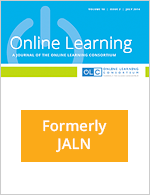Meeting Accreditation Requirements: Are You Serving Distance Learners?
Recent changes in the higher education landscape have called for greater access and accountability in a number of areas, most particularly distance learning. While there is a very significant instructional aspect to this equation, providing effective support and services to students enrolled in online education is becoming comparatively important, especially with accrediting bodies. However, in meeting the needs of this unique population, institutions are discovering that the services they provide to distance learners can be offered to all students, regardless of where they live or how they choose to take their classes. This article provides an overview of the Welcome Center, created in 2009 at Florida State College at Jacksonville, as a model for delivering quality and effective online student services to students, to include strategic planning, assessment and evaluation, environmental work design, functions, staffing, training, and technological systems.

